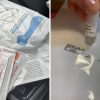As Boston Public Schools prepared to close on Tuesday over its forecast frigid weather, Mayor Michelle Wu signaled strongly that the schools may activate remote learning in the face of the COVID-19 surge, despite a state-level resistance to remote learning.
"Whether or not we get credit from the state for a day of remote learning ... if a school needs to do that because of staffing issues, we are going to take that [option] if that's the safest way to administer learning that day," Wu said from City Hall Monday. "It just means that we would have to make up days through the end of the year."
More Politics
The state education department's stance is that days of remote learning will not count toward the required 180 school days per academic year. The mayor has previously indicated school staffing challenges, triggered by the pandemic and the city's changing vaccination policy, may cause a departure from state guidelines.
Policies for weather-related school cancellations, such as Tuesday’s anticipated cold spell, require additional days to be added onto the end of the school year when BPS exceeds its five allotted snow cancellations in its calendar. Wu's comments came Monday as she announced the year's second weather-related closure for BPS. The last time schools closed for cold weather, the administration said, was in January 2015.
Wu said Monday she is open to making similar additions to supplement remote learning days if pandemic conditions continue to trigger massive worker absences.
"If staffing challenges persist at certain schools, and we would need to do this at a school-by-school basis, many of these schools are already preparing to offer remote learning whether or not it gets counted by the state," she said, adding that Boston appreciated the "maximum flexibility in administering what is safest" for students that still provides "a high-quality learning experience."
BPS struggled to cope with about 1,200 staff absences Monday, though not all were teachers and not all were due to COVID-19. Wu did not specify what portion of the absences were COVID-related, but the city's current positivity rate stands at more than 30%, a factor Wu linked to the school district's current staff shortage.
A new vaccination policy from the Wu administration goes into effect at the end of the week, eliminating an option that allowed city workers to avoid vaccination in exchange for submitting to weekly COVID-19 testing. Following the mayor's press conference, BPS could not immediately identify how many staff members it expects to be out of compliance at the end of the week.
Boston, like the state, the nation and cities around the world, is in the midst of a COVID-19 surge due to the fast-spreading and highly contagious omicron variant.
Hospitalizations in Boston have increased "about 50% in the last week," with more than 2,200 positive cases each day, according to city public health commission director Dr. Bisola Ojikutu. Emergency room visits, she added, have also increased about 30% in the past week.
Ojikutu said the city is recommending a number of surge mitigation strategies, including increased surveillance testing to identify cases early, enforcing isolation practices for those who test positive and requiring a negative test to return to school.
“Boston is going to make it work and we are going to provide a high-quality, safe, supportive learning environment for our students no matter what policies we’re facing from the state and federal government,” said Wu, adding she does not anticipate an indefinite, district-wide closure.









